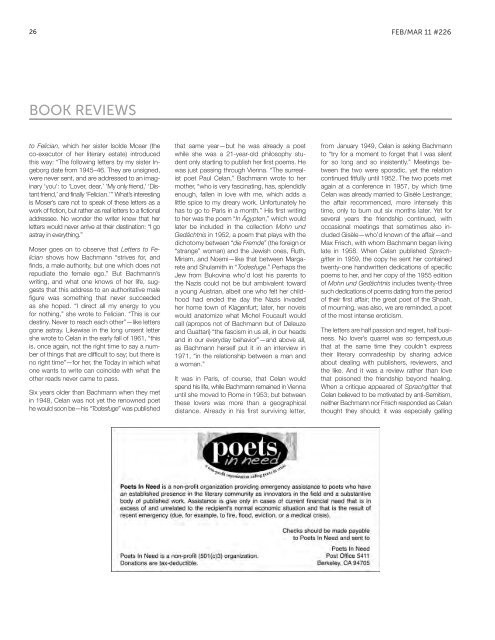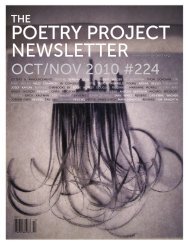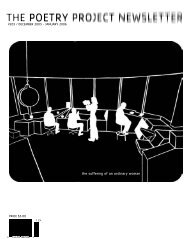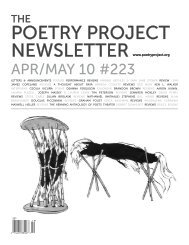26 FEB/MAR 11 #226BOOK REVIEWSto Felician, which her sister Isolde Moser (theco-executor of her literary estate) introducedthis way: “<strong>The</strong> following letters by my sister Ingeborgdate from 1945–46. <strong>The</strong>y are unsigned,were never sent, and are addressed to an imaginary‘you’: to ‘Lover, dear,’ ‘My only friend,’ ‘Distantfriend,’ and finally ‘Felician.’” What’s interestingis Moser’s care not to speak of these letters as awork of fiction, but rather as real letters to a fictionaladdressee. No wonder the writer knew that herletters would never arrive at their destination: “I goastray in everything.”Moser goes on to observe that Letters to Felicianshows how Bachmann “strives for, andfinds, a male authority, but one which does notrepudiate the female ego.” But Bachmann’swriting, and what one knows of her life, suggeststhat this address to an authoritative malefigure was something that never succeededas she hoped. “I direct all my energy to youfor nothing,” she wrote to Felician. “This is ourdestiny. Never to reach each other”—like lettersgone astray. Likewise in the long unsent lettershe wrote to Celan in the early fall of 1961, “thisis, once again, not the right time to say a numberof things that are difficult to say; but there isno right time”—for her, the Today in which whatone wants to write can coincide with what theother reads never came to pass.Six years older than Bachmann when they metin 1948, Celan was not yet the renowned poethe would soon be—his “Todesfuge” was publishedthat same year—but he was already a poetwhile she was a 21-year-old philosophy studentonly starting to publish her first poems. Hewas just passing through Vienna. “<strong>The</strong> surrealistpoet Paul Celan,” Bachmann wrote to hermother, “who is very fascinating, has, splendidlyenough, fallen in love with me, which adds alittle spice to my dreary work. Unfortunately hehas to go to Paris in a month.” His first writingto her was the poem “In Ägypten,” which wouldlater be included in the collection Mohn undGedächtnis in 1952, a poem that plays with thedichotomy between “die Fremde” (the foreign or“strange” woman) and the Jewish ones, Ruth,Miriam, and Noemi—like that between Margareteand Shulamith in “Todesfuge.” Perhaps theJew from Bukovina who’d lost his parents tothe Nazis could not be but ambivalent towarda young Austrian, albeit one who felt her childhoodhad ended the day the Nazis invadedher home town of Klagenfurt; later, her novelswould anatomize what Michel Foucault wouldcall (apropos not of Bachmann but of Deleuzeand Guattari) “the fascism in us all, in our headsand in our everyday behavior”—and above all,as Bachmann herself put it in an interview in1971, “in the relationship between a man anda woman.”It was in Paris, of course, that Celan wouldspend his life, while Bachmann remained in Viennauntil she moved to Rome in 1953; but betweenthese lovers was more than a geographicaldistance. Already in his first surviving letter,from January 1949, Celan is asking Bachmannto “try for a moment to forget that I was silentfor so long and so insistently.” Meetings betweenthe two were sporadic, yet the relationcontinued fitfully until 1952. <strong>The</strong> two poets metagain at a conference in 1957, by which timeCelan was already married to Gisèle Lestrange;the affair recommenced, more intensely thistime, only to burn out six months later. Yet forseveral years the friendship continued, withoccasional meetings that sometimes also includedGisèle—who’d known of the affair—andMax Frisch, with whom Bachmann began livinglate in 1958. When Celan published Sprachgitterin 1959, the copy he sent her containedtwenty-one handwritten dedications of specificpoems to her, and her copy of the 1955 editionof Mohn und Gedächtnis includes twenty-threesuch dedications of poems dating from the periodof their first affair; the great poet of the Shoah,of mourning, was also, we are reminded, a poetof the most intense eroticism.<strong>The</strong> letters are half passion and regret, half business.No lover’s quarrel was so tempestuousthat at the same time they couldn’t expresstheir literary comradeship by sharing adviceabout dealing with publishers, reviewers, andthe like. And it was a review rather than lovethat poisoned the friendship beyond healing.When a critique appeared of Sprachgitter thatCelan believed to be motivated by anti-Semitism,neither Bachmann nor Frisch responded as Celanthought they should; it was especially galling
THE POETRY PROJECT NEWSLETTER27BOOK REVIEWSthat Frisch had advised him to beware mixingup wounded vanity with deeper issues. “I do notknow whether it is true of you,” Frisch wrote,“but I know how glad I sometimes am to learnthat a critic who offends my ambition is a shadycharacter politically.” Celan’s need for supportbecame a kind of blackmail: “Your letter,” saidFrisch, “does not ask me—your letter gives me achance to prove myself if I react to the review…in the same way as you.” Neither Bachmannnor Frisch, though their letters evince genuineconcern for Celan, responded as he required,and so, he wrote, “As hard as it is for me, Ingeborg—andit is hard for me—I must now askyou not to write to me, not to call me, not tosend me any books; not now, not in the monthsahead, not for a long time. And please, both ofyou, do not force me to send back your letters!”Within a week he was taking it back, excusinga “cry for help” but in a manner that could onlyoffend—“you do not hear it, you are not withinyour own heart (where I expect you to be), youare…in literature.” <strong>The</strong> correspondence limpedon for another two years, but hopelessly. <strong>The</strong>unsent letter Bachmann wrote sometime afterSeptember 27, 1961, was its clear-eyed epitaph.“You want to be the victim,” she wrote.“You want them to have your ruin on theirconscience.” In hindsight, Bachmann’s wordsseem prophetic. Celan and Bachmann are twoof the outstanding poets of the twentieth century—Celan,perhaps the greatest of all. Butthe reception of his work has been marred by atendency to see him simply as he demanded tobe seen: as the eternal victim, the entirely pureman surrounded by “cowardice, mendacity,infamy” (as he wrote to himself of Frisch’s letter).His blind spot was the certainty that whatmakes for fascism was entirely outside himself.Bachmann was in many ways more clear-eyed.One closes this book admiring her more thanbefore, but wanting to read Celan more warily.<strong>The</strong> Port of Los AngelesJane Sprague(Chax Press, 2009)review by diane ward<strong>The</strong> Port of Los Angeles gathers together JaneSprague’s writings around “the flow” that transcendsgoods and information, chemistry andeconomics, unending consumption and poeticplace. More than a place of destination orhome, the Port of Los Angeles is a continualpresence in Sprague’s life that becomes a metaphorictransformation machine—“whether wewanted this or not // it was there // was us // definingus we // all the time now”. To live and writewithin the reach of the Port is to be subsumedby transcendent, shifting scales of physicalityand connectedness that offer Sprague the opportunityto critique “Citizen Jane” in a “sulliedbiosphere”. This biosphere is where we observethat “glacial ice… / shears off melting / sciencesee it explode”. But this is not a controlled experiment,and Sprague’s critique necessarilyseeps beyond discrete binaries (science andsubject, observer and observed, cause andeffect) and begins to encompass the transformationof the observed within the “observableenvironment”, that thing out there that containsus and all our things. <strong>The</strong> resulting field of focusincludes the subject as context, as well asthe context as subject. <strong>The</strong> Port of Los Angelesis situated in the gap between what “sciencesees” and what the objectified can “know”—its multi-directional exploration of movementtransforms itself just as it transforms its context.Sprague moved from upstate New York toSouthern California where “we found ourselvesperfectly pitched at the edge of globalism / thelip”. Her new life—“our perfect hemmed-inness”—wasnow contained in a small beachbungalow in a neighborhood developed on aseries of islands built from landfill in the thoroughlydredged Alamitos Bay at the mouthof the San Gabriel River. This manufacturedplace was conceived as the “the dreamland ofSouthern California.” Sprague’s neighborhood ofItalianate street names sits within a network ofcanals populated by small boats, a perpetuallysimulated tableau of leisure. From here, Spragueobserves the Port—the busiest container portin the U.S., receiving mass-produced goodsfrom China, shipping out the recyclable detritusof consumption (such as cardboard) back toChina, while producing toxic levels of air pollutionand exponentially elevated rates of cancer.<strong>The</strong> Port of Los Angeles is not about a place orthe permanence of objects, just as the Port isnot a destination, but a node, a place of connection.<strong>The</strong>se connections result from theincessant flow that seems to “flatten” distinctions.<strong>The</strong> environment, the goods, and theinhabitants’ physicality are devoid of difference(“same hand / same sound / same nation citystreet…”), forcibly “parsed into sectors or boxesof labeled and specific function…” and destabilized(“a word beyond patience”). And yet,Fantasy, Intuition, MemoryA special lecture in conjunction withour current exhibit, Chaim Gross Drawings 1944-50Dr. Carla BillitteriAssociate Professor of English, University of MaineSaturday, March 5, 2011 at 2 pmRSVP by Feb. 25 to: info@rcgrossfoundation.orgInformation: www.rcgrossfoundation.orgBarry Schwabsky is art critic for <strong>The</strong> Nation and coeditorof international reviews for Artforum. His mostrecent publications of poetry are Book Left Open inthe Rain (Black Square Editions/<strong>The</strong> Brooklyn Rail,2009) and 12 Abandoned Poems (Kilmog Press, 2010).
















